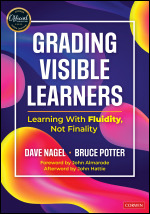Grading Visible Learners
Learning With Fluidity, Not Finality
- Dave Nagel - Education Consultant
Foreword by John Almarode, Afterword by John Hattie
Transform your grading and assessment practices into powerful tools for student success
When we implement a grading system that prioritizes completion and compliance and penalizes students who take risks, we disrupt the learning journey—not further it. It's time to align how we grade with what we know from research works best and help move learning forward for all students.
Grading Visible Learners provides educators with practical solutions for improving grading approaches, actions, and practices as well as concrete tools and strategies teachers and collaborative teams can adapt and use in their classrooms and schools right away. Inside you'll find
- Traits to promote in students so they can drive their own learning
- Examples of grading and feedback actions that foster assessment capability in students
- Tools, templates, and work samples to help you improve your grading practices
- Guidance on how to promote goal-setting as well as help teachers and students view grades as feedback rather than an ending point in the learning journey
- Multiple ways for students to show growth and progress
In this hands-on guidebook, you will discover how to best impact learning and ensure that grading serves as a constructive tool and conduit to maximizing impact on student learning rather than a hindrance to student success.
"The authors have done a great service by bringing the cornerstone concepts of the Visible Learning methodology together with the practice of grading that actually promotes and focuses on learning."
"Grading Visible Learners is a must-read for any educator looking to transform their grading practices and create a classroom where learning is visible, measurable, and impactful. This book masterfully combines research-based strategies with practical applications. It will help educators move away from the commonly held beliefs about grading towards grading practices that align with the research and the principles of Visible Learning to truly impact student growth and achievement.
"Grading Visible Learners walks educational practitioners through the necessary steps of implementing the critical components of grading that provide clarity and effective feedback to all stakeholders. This is a must for all educators. Learning is not final, it’s fluid."
"As a veteran teacher with 25 years of experience, I am always looking to refine my approach to meet the needs of my students and help them reach their potential. The ideas presented in Grading Visible Learners resonate deeply with me. The emphasis on shifting grading from a final assessment to a tool for ongoing feedback is a powerful reminder that our job as educators is to foster continuous growth rather than focus on static performance indicators. Grading should not just be a score but an opportunity for reflection, improvement, and deeper learning.
I particularly appreciate the focus on clarity and formative assessment. Over the years, I have seen students benefit most when they understand not just where they stand but also how they can move forward. This book reinforces that grading practices should be flexible and reflective of students' progress, not just their ability to meet standards at a single point in time. The approach aligns with my and any teacher’s efforts to create a classroom environment where feedback is meaningful and students are empowered to take ownership of their learning.
Embracing these strategies will continue to help me grow as a teacher and ensure that my students are not only aiming for a grade, but also developing as independent, confident learners. This is a must-read for any teacher who wants to make sure they are doing grading right!"
"The combination of research and theory combined with practical application tools, examples, and models in this book provides for a useful grading guidebook. It is important for any teacher developing their own grading principles, whether they are beginning their career and looking for an effective grading approach or they are a veteran teacher seeking to improve their current grading practices."
